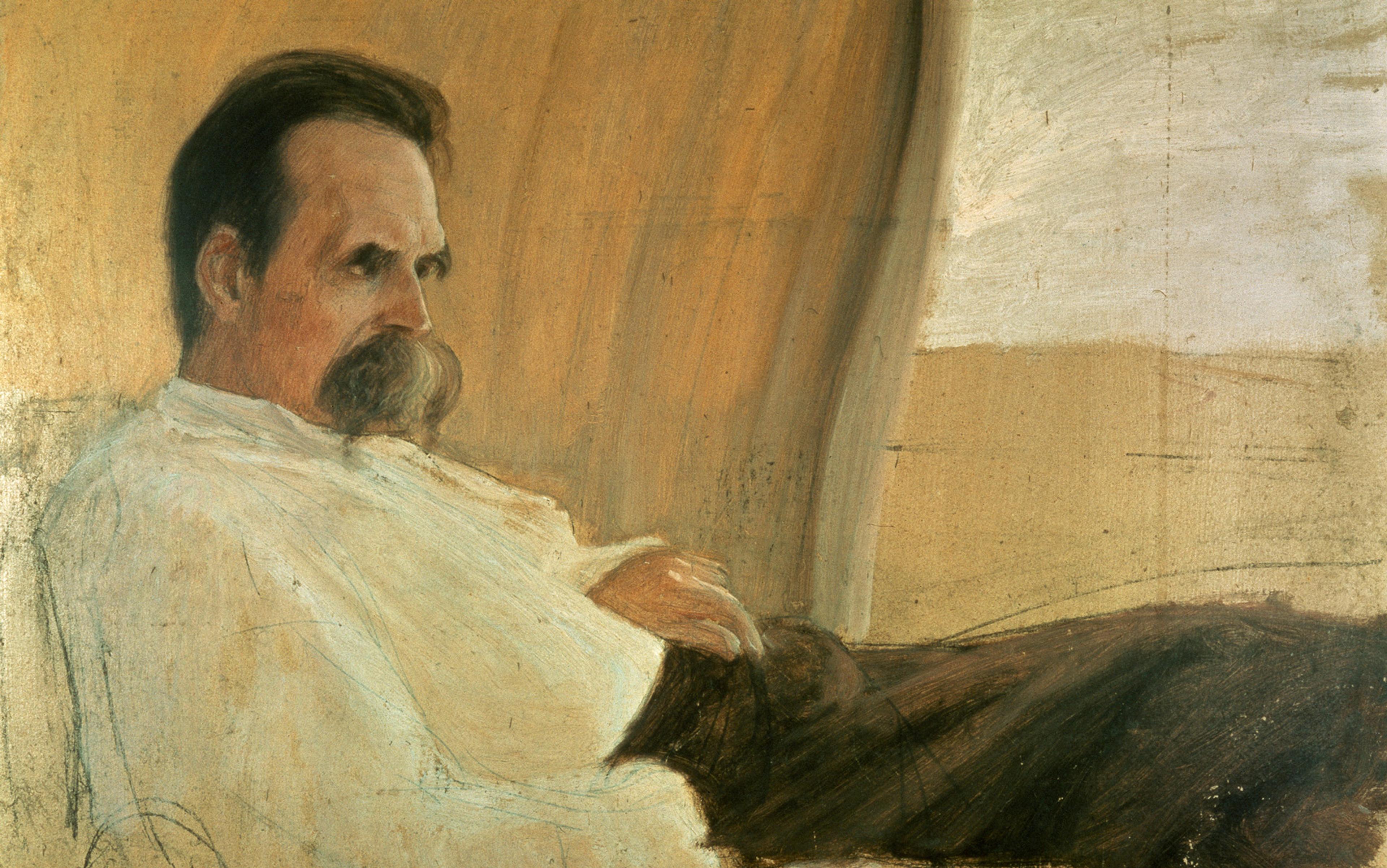Nihilism is a constant threat. As the 20th-century philosopher Hannah Arendt recognised, it is best understood not as a set of ‘dangerous thoughts’, but as a risk inherent in the very act of thinking. If we reflect on any specific idea long enough, no matter how strong it seems at first, or how widely accepted, we’ll start to doubt its truth. We might also begin to doubt whether those who accept the idea really know (or care) about whether or not the idea is true. This is one step away from thinking about why there is so little consensus about so many issues, and why everyone else seems to be so certain about what now appears to you so uncertain. At this point, on the brink of nihilism, there’s a choice: either keep thinking and risk alienating yourself from society; or stop thinking and risk alienating yourself from reality.
A century before Arendt, Friedrich Nietzsche described in his notebooks (published posthumously by his sister in The Will to Power) a choice between ‘active ‘ and ‘passive’ nihilism. One of his many aphorisms on nihilism was that it is the result of the highest values devaluing themselves. Values such as truth and justice can come to feel like they are not merely ideas, but that they have some supernatural power, particularly when we say: ‘The truth will set you free’ or ‘Justice will be served.’ When these values turn out not to have the power attributed to them, when truth turns out not to be liberating, when justice doesn’t ensue, we become disillusioned. Yet, rather than blame ourselves for putting too much faith in these values, we instead blame the values for not living up to our expectations.
According to Nietzsche, we can then become active nihilists and reject the values given to us by others in order to erect values of our own. Or we can become passive nihilists and continue to believe in traditional values, despite having doubts about the true value of those values. The active nihilist destroys in order to find or create something worth believing in. Only that which can survive destruction can make us stronger. Nietzsche and the group of 19th-century Russians who self-identified as nihilists shared this outlook. The passive nihilist however does not want to risk self-destruction, and so clings to the safety of traditional beliefs. Nietzsche argues that such self-protection is in reality an even more dangerous form of self-destruction. To believe just for the sake of believing in something can lead to a superficial existence, to the complacent acceptance of believing anything believed by others, because believing in something (even if it turns out to be nothing worth believing in) will be seen by the passive nihilist as preferable to taking the risk of not believing in anything, to taking the risk of staring into the abyss – a metaphor for nihilism that appears frequently in Nietzsche’s work.
Today, nihilism has become an increasingly popular way to describe a widespread attitude towards the current state of the world. Yet when the term is used in conversation, in newspaper editorials or in social media rants, it is rarely ever defined, as if everyone knows very well what nihilism means and shares the same definition of the concept. But as we have seen, nihilism can be both active and passive. If we want a better understanding of contemporary nihilism, we should identify how it has evolved in epistemology, ethics and metaphysics, and how it has found expression in different ways of life, such as in self-denial, death-denial and world-denial.
In epistemology (the theory of knowledge), nihilism is often seen as the denial that knowledge is possible, the stance that our most cherished beliefs have no bedrock. The argument for epistemological nihilism is based on the idea that knowledge requires something more than just a knower and a known. That something more is typically seen as what makes knowledge objective, as the ability to refer to something outside of one’s personal, subjective experience is what separates knowledge from mere opinion.
But for epistemological nihilism, there is no standard, no foundation, no ground upon which one can make knowledge claims, nothing to justify our belief that any particular claim is true. All appeals to objectivity seen from the perspective of epistemological nihilism are illusory. We create the impression of knowledge to hide the fact that there are no facts. For example, as Thomas Kuhn argued in The Structure of Scientific Revolutions (1962), we can certainly develop very complicated and very successful models for describing reality, which we can use to discover a wealth of new ‘facts’, but we can never prove that these correspond to reality itself – they could simply derive from our particular model of reality.
If something is claimed to be true based on past experience, then the problem of induction arises: just because something has happened does not entail that it must happen again. If something is claimed to be true based on scientific evidence, then there arises the problem of appealing to authority. In logic, such appeals are seen as committing a fallacy, as the claims of others, even the claims of experts, are not seen as grounds for truth. In other words, even experts can be biased and can make mistakes. Furthermore, as scientists make claims based on the work of previous scientists, then they too can be seen as making appeals to authority. This leads to another problem, the problem of infinite regress. Any claim to knowledge based on some foundation inevitably leads to questions about the foundation of that foundation, and then the foundation of that foundation, and so on, and so on, and so on.
In trivialising doubts about knowledge, the passive nihilist trivialises the pursuit of knowledge
At this point, it might seem that what I am here calling ‘epistemological nihilism’ is really no different than skepticism. For the skeptic likewise questions the foundations upon which knowledge claims are taken to rest, and doubts the possibility of knowledge ever finding any sure ground. Here it would be useful to return to Nietzsche’s distinction between active and passive nihilism. Whereas the active nihilist would be similar to the radical skeptic, the passive nihilist would not be. The passive nihilist is aware that skeptical questions can be raised about knowledge. But rather than doubt knowledge, the passive nihilist continues to believe in knowledge. Consequently, for the passive nihilist, knowledge exists, but it exists on the basis of faith.
Nihilism is therefore not only to be found in the person who rejects knowledge claims for lacking an indubitable foundation. Rather, a person who is aware of the doubts surrounding knowledge claims and who nevertheless continues to act as though those doubts don’t really matter is also a nihilist.
Scientific theories can be based on appeals to other theories, which are based on appeals to other theories, any one of which could be based on a mistake. But so long as scientific theories continue to produce results – especially results in the form of technological advances – then doubts about the ultimate truth of those theories can be seen as trivial. And in trivialising doubts about knowledge, the passive nihilist trivialises the pursuit of knowledge.
In other words, for the passive nihilist, knowledge doesn’t matter. Just think about how often words such as ‘knowledge’ or ‘certainty’ are used haphazardly in everyday life. Someone says that they know the train is coming, and either we don’t ask how they know or, if we do ask, we’re often met with the absolute foundation for knowledge in contemporary life: because their phone says so. The phone might turn out to be right, in which case the phone’s claim to authority is preserved. Or the phone might turn out to be wrong, in which case we are likely to blame not the phone but the train. Since the phone has become our primary guarantor of knowledge, to admit that the phone could be wrong is to risk having to admit that not only could our phone-based knowledge claims be baseless, but that all of our knowledge claims could be. After all, just like with the phone, we tend not to ask why we think we know what we think we know. In this way, passive nihilism becomes, not a radical ‘postmodern’ position, but rather a normal part of everyday life.
In moral philosophy, nihilism is seen as the denial that morality exists. As Donald A Crosby argues in The Specter of the Absurd (1988), moral nihilism can be seen as a consequence of epistemological nihilism. If there exist no grounds for making objective claims about knowledge and truth, then there exist no grounds for making objective claims about right and wrong. In other words, what we take to be morality is a matter of what is believed to be right – whether that belief is relative to each historical period, to each culture or to each individual – rather than a matter of what is right.
To claim that something is right has been done historically by basing these claims on a foundation such as God, or happiness, or reason. Because these foundations are seen as applying universally – as applying to all people, in all places, in all times – they are seen as necessary to make morality apply universally.
The 18th-century moral philosopher Immanuel Kant recognised the danger of grounding morality on God or on happiness as leading to moral skepticism. The belief in God can motivate people to act morally, but only as a means to the end of ending up in heaven rather than hell. The pursuit of happiness can motivate people to act morally, but we can’t be certain in advance what action will result in making people happy. So, in response, Kant argued for a reason-based morality instead. According to him, if a universal foundation is what morality needs, then we should simply make decisions in accordance with the logic of universalisability. By determining what we are trying to achieve in any action, and by turning that intention into a law that all rational beings must obey, we can use reason to determine if it is logically possible for the intended action to be universalised. Logic – rather than God or desire – can therefore tell us if any intended action is right (universalisable) or wrong (not universalisable).
There are, however, several problems with trying to base morality on reason. One such problem, as pointed out by Jacques Lacan in ‘Kant with Sade’ (1989), is that using universalisability as the criterion of right and wrong can let clever people (such as the Marquis de Sade) justify some seemingly horrific actions if they can manage to show that those actions can actually pass Kant’s logic test. Another problem, as pointed out by John Stuart Mill in Utilitarianism (1861), is that humans are rational, but rationality is not all that we have, and so following Kantian morality forces us to live like uncaring robots rather than like people.
Yet another problem, as pointed out by Nietzsche, is that reason might not be what Kant claimed it to be, as it is quite possible that reason is no firmer a foundation than is God or happiness. In On the Genealogy of Morals (1887), Nietzsche argued that reason is not something absolute and universal but rather something that has evolved over time into part of human life. In much the same way that mice in a lab experiment can be taught to be rational, so too have we learned to become rational thanks to centuries of moral, religious and political ‘experiments’ in training people to be rational. Reason should not be seen therefore as a firm foundation for morality since its own foundations can be called into question.
The passive nihilist would rather navigate using a faulty compass than risk feeling completely lost
Here again we can find an important distinction between how the active nihilist and the passive nihilist respond to such moral skepticism. The ability to doubt the legitimacy of any possible foundation for morality can lead the active nihilist to either redefine morality or to reject morality. In the first instance, actions can be judged using moral principles, but the active nihilist is the one who determines those principles. But what seems to be creative could in fact be derivative, as it is difficult to distinguish when we are thinking for ourselves as opposed to when we are thinking in accordance with how we were brought up.
So rather than such moral egoism, it is more likely that the active nihilism will simply reject morality altogether. Instead, actions are judged only in practical terms, such as what is more or less efficient towards achieving a desired end. Human actions are therefore seen as no different than the actions of an animal or a machine. If it seems like a mistake to say that an animal is evil for eating another animal when it is hungry, then the active nihilist will say it is likewise a mistake to say that humans are evil for stealing from another human when they are hungry.
Without morality, concepts such as theft, property or rights are seen as having only legal standing. Actions can be seen as criminal but not as immoral. An example of such active nihilism can be seen in the Ancient Greek sophist Thrasymachus. In Plato’s Republic, Thrasymachus argues that ‘justice’ is merely propaganda used by the strong to oppress the weak, by tricking them into accepting such oppression as what is just.
The passive nihilist, on the other hand, doesn’t reject traditional morality just because its legitimacy can be questioned. Instead, the passive nihilist rejects the idea that the legitimacy of morality really matters. The passive nihilist obeys morality, not for the sake of morality, but for the sake of obedience. To live in accordance with what is believed by others to be right and wrong, to be good and evil, is seen by the passive nihilist as preferable to having to live without any such moral standards to guide decision-making. Moral standards provide a compass, and the passive nihilist would rather navigate life using a faulty compass than risk going through life feeling completely lost.
Moral standards also provide the feeling of belonging to a community. Sharing norms and values is as important for sharing a way of life as is sharing a language. In rejecting morality, the active nihilist is therefore also rejecting community. But the passive nihilist is unwilling to risk feeling completely alone in the world. So, by rejecting moral legitimacy, the passive nihilist is embracing community. What matters to the passive nihilist then is not whether a moral claim is true, but whether a moral claim is popular.
This means that, for the passive nihilist, morality doesn’t matter. The passive nihilist values morality as a means to an end, not as an end in itself. Because the desire to belong and to be led outweighs the desire to have moral certainty, the passive nihilist cares only about the sense of direction and the sense of community that can come from accepting a moral system. The passive nihilist is like a spectator at a sporting event who roots for the home team just because that’s what everyone else is doing. The passive nihilist supports moral standards just because they are accepted by the community to which the passive nihilist wants to belong.
Just as epistemological nihilism can lead to moral nihilism, so moral nihilism can lead to political nihilism. Political nihilism is typically understood as the rejection of authority. This was the case with the aforementioned self-identified nihilists of 19th-century Russia, who ultimately succeeded in assassinating the tsar. However, this revolutionary form of political nihilism, which we can identify with active nihilism, does not capture the passive form of political nihilism.
The danger of active nihilism comes from its anarchic willingness to destroy society for the sake of freedom. The danger of passive nihilism comes from its conformist willingness to destroy freedom for the sake of society. As we have already seen, the passive nihilist instrumentalises knowledge and morality by treating both as important only insofar as they serve as means to the ends of comfort and security. The need to feel protected from the discomfort of doubt and from the insecurity of instability is what leads the passive nihilist to become ultimately more destructive than the active nihilist.
The danger here is that the moral and political systems that promote freedom and independence will be seen as less desirable to the passive nihilist than the moral and political systems that promote dogmatic acceptance of tradition and blind obedience to authority. Though we might say we want to be free and independent, such liberation can feel like a terrible burden. This was expressed for example by Søren Kierkegaard in The Concept of Anxiety (1844) when he described anxiety as the ‘dizziness of freedom’ that arises when we look down at what appears to us as the ‘abyss’ of endless possibility. Just think of how often being presented with a menu full of options leads restaurant-goers to ask the server for a recommendation. Or how Netflix went from promoting its vast library of movies for you to choose from to promoting its algorithm that would let you ‘chill’ while it makes choices for you.
Nihilism can be promoted by those in power who benefit from such crises
Nietzsche was worried by what he saw as the growing acceptance of selflessness, self-sacrifice and self-denial as moral ideals. He saw the acceptance of such self-negating ideals as evidence that passive nihilism was spreading like a disease through 19th-century Europe. In the 20th century, Erich Fromm in Escape from Freedom (1941) similarly worried about what he described as the ‘fear of freedom’ spreading across Europe. It was this worry that motivated the work of both critical theorists in Germany and of existentialists in France.
Arendt warned that we should be careful not to think of nihilism as merely a personal crisis of uncertainty. Rather, we must recognise that nihilism is a political crisis. Nihilism can be promoted by those in power who benefit from such crises. Hence even metaphysical nihilism can carry political weight. Accepting that the universe is meaningless can lead to viewing concerns about oppression, about war, about the environment as meaningless too. For this reason, it is not only politicians who can benefit from nihilism.
According to Simone de Beauvoir in The Ethics of Ambiguity (1948), one of the forms that nihilism can take is nostalgia – the desire to return to how free we felt as children before we discovered as adults that freedom entails responsibility. Corporations can therefore also benefit from promoting nihilism in the form of selling us nostalgia and other ways to distract ourselves from reality. This is why we must not only recognise the nihilism in ourselves, but also recognise that it exists in the world around us, and identify the sources of that nihilism. Rather than letting ourselves feel powerless in a world that seems to have stopped caring, we should ask where nihilistic views of the world are coming from, and who benefits from our seeing the world that way.






